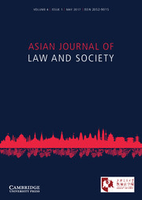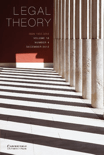
Ratio Juris
Scope & Guideline
Championing Open Access in Legal Scholarship
Introduction
Aims and Scopes
- Interdisciplinary Legal Studies:
The journal emphasizes a cross-disciplinary approach, incorporating insights from sociology, psychology, and cultural studies to analyze legal phenomena. - Human Rights and Social Justice:
A core focus on human rights issues and the pursuit of social justice, particularly in the context of Latin America and the Caribbean. - Cultural and Political Criminology:
Exploring the intersections of culture, crime, and law, Ratio Juris investigates how cultural narratives shape legal frameworks and vice versa. - Environmental Law and Policy:
The journal increasingly addresses environmental concerns, particularly in relation to social inequalities and the impacts of climate change on legal systems. - Critical Legal Theory:
Engagement with critical legal theory, including discussions on the implications of law for marginalized communities and alternative legal frameworks.
Trending and Emerging
- Intersections of Law and Technology:
An increasing number of publications explore the implications of technology on legal frameworks, particularly in areas such as data protection and the impact of artificial intelligence on human rights. - Eco-Legal Studies:
There is a rising trend in eco-legal discussions that connect environmental issues with legal frameworks, particularly in the context of social justice and inequality. - Feminist and Gender Perspectives in Law:
Growing emphasis on feminist legal theory and the exploration of gender issues within legal contexts, reflecting broader societal movements for gender equality. - Postcolonial and Decolonial Legal Studies:
Emerging themes focus on postcolonial critiques of legal systems and the need for decolonization of legal practices, especially in Latin American contexts. - Social Movements and Law:
A trend towards analyzing the role of social movements in shaping legal reforms and the interaction between grassroots activism and legal change.
Declining or Waning
- Traditional Legal Frameworks:
There has been a noticeable decrease in articles focusing solely on traditional legal frameworks without consideration of social or cultural contexts, signaling a shift towards more interdisciplinary approaches. - Historical Legal Analyses:
While historical perspectives remain relevant, there has been a reduction in papers that focus exclusively on historical legal analysis, as contemporary issues gain precedence. - Conventional Approaches to Criminal Law:
The journal has seen fewer articles that pursue conventional criminal law discussions without integrating social justice or critical perspectives, indicating a move towards more progressive discussions.
Similar Journals

LAW & SOCIETY REVIEW
Illuminating the Interplay between Law and SocietyLAW & SOCIETY REVIEW is a prestigious academic journal published by Wiley, recognized for its significant contributions to the intertwined fields of law, sociology, and political science. With an impressive impact factor that underscores its relevance, the journal boasts a 2023 Q1 designation in both Law and Sociology, highlighting its elite status within these disciplines. Since its inception in 1977, the journal has served as a critical platform for innovative research and discourse, reflecting contemporary issues that influence legal and societal frameworks. Although it does not currently offer open access options, its robust archival resources and global reach ensure that researchers, practitioners, and students can benefit from the insights and empirical studies presented within its pages. With Scopus rankings placing it in the top percentiles of its field, LAW & SOCIETY REVIEW remains essential for those seeking to deepen their understanding of law in its social context and explore the complexities of legal systems and their societal impacts.

Alternative Law Journal
Elevating Diverse Voices in Legal Scholarship.Alternative Law Journal, published by SAGE Publications Ltd, stands as a pivotal platform for critical discourse within the fields of law, sociology, and political science. Since its inception in 2008, the journal has fostered innovative scholarship aimed at exploring the intersections of legal practices and social justice, making it an essential resource for researchers, practitioners, and students alike. With its current ranking at Q3 in both the Law and Sociology categories according to the latest Scopus metrics, the Alternative Law Journal ensures a robust academic discourse, promoting diverse perspectives and challenging conventional norms. The journal's address reflects its international reach, further underscoring its commitment to fostering a global dialogue on pressing legal and societal issues. This journal is crucial for anyone seeking to stay updated with contemporary thoughts and research impacting law and society.

Asian Journal of Law and Society
Shaping Contemporary Legal Thought Across AsiaAsian Journal of Law and Society, published by Cambridge University Press, serves as a vital platform for scholarly discourse in the fields of law and social sciences. With an impressive 2023 impact factor placing it in the Q2 quartile in both law and sociology/political science categories, this journal is influential in shaping contemporary legal and sociological thought. Covering a broad range of topics, from legal frameworks in Asian contexts to the interplay between law and societal dynamics, the journal invites researchers, practitioners, and students to contribute original articles, critiques, and interdisciplinary analyses. Although it does not currently offer open access options, the Asian Journal of Law and Society continues to be recognized for its significant contributions, as reflected in its Scopus rankings, where it is positioned in the top 30% of law journals and around the 44% ranking in sociology and political science. This trajectory highlights its importance for anyone interested in understanding the complex legal landscapes and social structures across Asia.

Legal Theory
Bridging Legal Norms with Philosophical InquiryLegal Theory, published by Cambridge University Press, stands as a significant academic journal dedicated to the exploration of the conceptual foundations and implications of law within the wider realm of philosophy. Established in 1995 and maintaining a consistent publication record through 2023, the journal has garnered a reputation for its high-quality scholarly contributions, reflected in its impressive rankings: Q2 in Law and Q1 in Philosophy as of 2023. With an impactful presence in the Scopus Ranks, Legal Theory is positioned 158th in Philosophy and 337th in Law, highlighting its relevance and influence—especially within the arts and humanities. This journal serves as a critical platform for researchers, professionals, and students who seek to engage with the intricate interplay between legal norms and philosophical inquiries. Though not open access, it offers a wealth of knowledge that is integral to advancing discourse in legal philosophy, making it an essential resource for those looking to deepen their understanding of contemporary legal theories and their implications.

Revista CES Derecho
Cultivating a Rich Exchange of Ideas in Law.Revista CES Derecho is a distinguished academic journal published by UNIV CES, focused on the multifaceted field of law. Situated in Medellin, Colombia, this journal serves as a vital platform for disseminating innovative research and critical analysis in legal studies, encouraging the exchange of ideas among scholars, practitioners, and students alike. With its commitment to open access, the journal provides unfettered access to its content, ensuring that its valuable insights reach a diverse audience. Although specific metrics such as H-Index and Scopus rankings are currently unavailable, the Revista CES Derecho aims to enhance the quality of legal education and practice by fostering scholarly discourse and informing progressive legal thought. Researchers and practitioners are invited to contribute to this dynamic publication, further enriching the discourse in the ever-evolving landscape of law.

Prolegomenos-Derechos y Valores
Cultivating innovative ideas in jurisprudential studies.Prolegomenos-Derechos y Valores, published by UNIV MILITAR NUEVA GRANADA, is a distinguished peer-reviewed journal that has been an essential platform for scholarly discourse in the fields of law and ethics since its inception. With an ISSN of 0121-182X and E-ISSN of 1909-7727, this journal adopts an open-access model, allowing researchers, professionals, and students unrestricted access to its rich repository of knowledge since 2004. The journal is committed to fostering critical dialogue on contemporary legal issues, human rights, and moral values, thus playing a vital role in shaping the jurisprudential landscape in Latin America and beyond. Based in Bogotá, Colombia, it serves as a bridge for international collaborations and showcases research that contributes to understanding the ethical underpinnings of legal frameworks. By prioritizing high-quality scholarship and facilitating access to innovative ideas, Prolegomenos-Derechos y Valores aims to be a cornerstone resource for those engaged in the pursuit of legal knowledge and reform.

Vox Juris
Advancing legal discourse, one article at a time.Vox Juris is a premier academic journal dedicated to the field of legal studies, published by the esteemed Universidad San Martin de Porres, Fondo Editorial. Since its transition to Open Access in 2015, it has significantly enhanced the dissemination of high-quality legal research and scholarship, providing unrestricted access to a wide audience of researchers, professionals, and students globally. Although the journal's H-index and specific scope are currently unspecified, it actively contributes to the discourse surrounding various facets of law, including theory, applications, and interdisciplinary perspectives. Located in the heart of Peru at SEDE LIMA JR LAS CALANDRIAS N0 151291 SANTA ANITA, Vox Juris serves as a vital resource for those seeking to explore and advance their understanding of contemporary legal issues. Its commitment to promoting scholarly dialogue makes it an indispensable platform for both emerging and established voices in the legal community.

Ius Humani-Revista de Derecho
Connecting Scholars to Shape Legal FuturesIus Humani-Revista de Derecho, published by Universidad Hemisferios, serves as a vital platform for discourse in the field of human rights law and its various dimensions. With an Open Access policy established since 2008, this journal ensures that scholarly articles, critical reviews, and original research are readily accessible to a global audience, fostering collaboration and innovation among researchers, professionals, and students alike. Although the journal is based in Quito, Ecuador, its reach extends internationally, making significant contributions to the understanding and application of human rights in legal frameworks. While it is still developing in terms of its HIndex and Scopus rankings, Ius Humani is poised to provide essential insights and discussions that reflect pressing legal issues and emerging trends in human rights law. Join the community of scholars engaging with this important field through Ius Humani, where knowledge is freely shared and impactful conversations are sparked.

German Law Journal
Advancing Legal Discourse in an Open Access EraGerman Law Journal, published by Cambridge University Press, stands as a leading open-access platform for scholarly discourse in the field of law, having made its content freely available since 2019. With an impressive impact factor that places it in the Q1 category for Law as of 2023, and a robust Scopus ranking of #164 out of 1025 in the social sciences category, this journal is recognized for its high-quality research and significant contributions to legal scholarship. The journal encompasses a wide array of topics pertinent to the German legal system, European Union law, and comparative legal studies, thus catering to researchers, legal practitioners, and students alike. Located in the heart of the UK, at Edinburgh Building, Shaftesbury Rd, Cambridge, this journal not only fosters academic engagement but also promotes interdisciplinary dialogues that enrich the understanding of legal principles in an evolving global context. Emphasizing accessibility and high academic standards, the German Law Journal serves as an essential resource for those seeking to explore and contribute to contemporary legal discussions.

Precedente
Innovative research, accessible knowledge.Precedente is a prominent academic journal published by UNIV ICESI that focuses on the multifaceted realm of social sciences, providing a platform for innovative research and discourse since 2001. With its Open Access policy, the journal ensures that research findings are accessible to a global audience, fostering the dissemination of knowledge and interdisciplinary collaboration. Situated in the vibrant academic landscape of Cali, Colombia, Precedente upholds a commitment to high-quality scholarship, evidenced by its growing influence and reputation among researchers, professionals, and students alike. By serving as a valuable resource for those engaged in advancing social science inquiry, the journal not only contributes to academic excellence but also helps address contemporary societal challenges through its diverse array of published works.